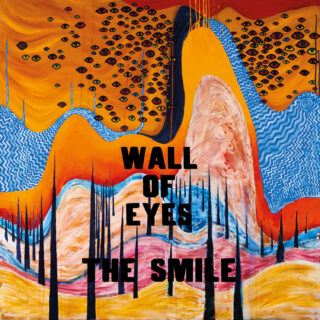The Smile
Wall of Eyes
(XL)
7/10

(XL)
7/10
It’s wise not to get your hopes up when faced with a side project. For every horizon-expanding offshoot (for notable recent examples, see Revelators Sound System, the spiritual jazz-channeling instrumental excursion by Hiss Golden Messenger’s MC Taylor), there’s a swamp of reverse-alchemy ‘supergroups’ to wade through, seemingly committed to proving just how much the frequently silent ‘other guys’ standing in the shadows of the more prominent band members brought to the table.
Perhaps unsurprisingly considering the band’s sluggish ways (the best part of a decade has passed since 2016’s alluring, richly textured A Moon Shaped Pool), Radiohead are no strangers to side projects. Guitarist Ed O’Brien has released solo material as EOB and drummer Philip Selway has authored a few albums of singer-songwriterly material. Bassist Colin Greenwood has recently accompanied Nick Cave’s solo shows. Yet the expectations have inevitably escalated whenever primary songwriter Thom Yorke has ventured away from the main brand.
At their best (OK Computer from 1997’s, 2000’s Kid A and 2007’s In Rainbows all belong firmly on any list of must-hear albums), Radiohead have managed to combine an unstinting devotion to avoiding predictable formulas with genuine mass appeal, leading to such logic-defying spectacles as groups of drunken fans singing along exuberantly to the desolate coda of twitchy neo-prog epic ‘Paranoid Android’ at the band’s huge 2017 outdoor show in Manchester. The cubist angst of Yorke’s two solo albums of predominantly frosty electronica, however, have provided ammunition for naysayers who feel that Radiohead’s excursions away from their fairly conventional indie-rock roots or the widescreen, brooding ‘Pink Floyd for the 1990s’ art-rock pomp have been at the expense of emotional resonance.
Even so, the emergence of The Smile via a stealth gig streamed as part of the online offerings by the 2021 Glastonbury Festival was greeted with the kind of frothy excitement that the actual outcomes would inevitably struggle to match. Starring Yorke and Radiohead guitarist Jonny Greenwood (who has kept busy away from the mothership as a composer of much-acclaimed film soundtracks, including such modern classics as There Will Be Blood) on multi-instrumentalist duty alongside esteemed Brit-jazz drummer Tom Skinner (Sons of Kemet), The Smile may have been intended as a spontaneous congregation of likeminded musicians, but any chance of low-pressure experimentation and adequately adjusted expectations was instantly erased by the colossally weighty baggage of the Radiohead connection.

The Smile’s 2022 debut actually matched the inflated expectations. There are bands and artists whose new releases tend to get plenty of bonus praise thanks to past achievements, but A Light for Attracting Attention genuinely deserved its place on the podium of various Best of 2022 polls. Granted, the project’s name referred to the rehearsed rictus grin of a seasoned liar rather than genuine expressions of mirth, and the album was infused with alarm at a world stuck on a steep downward spiral, with the most unworthy of scum floating to the surface again and again; yet A Light for Attracting Attention ultimately reverberated with disarming pleas to break free from division-sowing distractions, alongside blasts of murky, loose-limbed funkiness, neither of which are qualities that spring readily to mind when the Radiohead catalogue is examined. If the general idea was to find creative freedom away from the most likely stifling weight of expectation that inevitably accompanies anything put out under the Radiohead banner, including songs as unabashedly aligned with the band’s classic templates as the unity-yearning ‘The Same’ and the majestic ballad ‘Free In The Knowledge’ probably wasn’t the most obvious way to go about it (especially given the involvement of Radiohead producer and ‘sixth member’, Nigel Godrich).
Despite a more pronounced interest in vibrant hip-shaking, considerable swathes of A Light for Attracting Attention could easily have been mistaken for a long-awaited (and more than worthy) follow-up to A Moon Shaped Pool. The Smile’s second album, however, succeeds in establishing a unique and coherent musical identity that doesn’t instantly resemble what its three authors have dabbled in previously. With Godrich again on board – leading to butter-rich textures and endlessly rewarding little aural coves of ricocheting sounds – Wall of Eyes seems intent on maximizing the potential of Skinner’s versatile and fluid jazz chops. “This goes where it wants to be,” Yorke coos at one particularly tricksy polyrhythmic juncture of ‘Read The Room’, which certainly seems apt in the company of these eight multilayered, unpredictably unfolding tracks, often featuring the dramatic, lush swell of the London Contemporary Orchestra in a prominent role; at one point, it’s possible to hear Yorke mutter the beats to the exotic time signature on the vocal track, almost as if the trio themselves need some kind of a steady lodestar to anchor their more restless excursions away from conventional verse/chorus formulas.
 If the highlights of its predecessor excelled in emotional directness and hunger for communication, Wall of Eyes ventures deeply into the murkily unsettling undergrowth of unease, paranoia and unexplained goings-on. Anyone who can reliably outline what these songs are about deserves a cash prize, but there are asides that seem to drip with the rancid stench of the recently confirmed unethical carpet-bagging of Covid-era elites: “All of that money, where did it go? / In somebody’s pocket?/ A friend of a friend,” Yorke sings towards the end of skittishly floating ‘Friend of a Friend’, his final “loose change” rising into an anguished wail. Led by Yorke’s piano, the track – one of the highlights here, with its echoes of ‘Pyramid Song’ – could be classed as a pretty ballad, were it not for the anxiety-ridden references to exclusive (secret?) parties and easy (public?) money being surreptitiously pocketed. “Let us raise our glasses / To what we don’t deserve/ What we’re not worthy of,” Yorke mutters on the title track – possibly the iciest cut in living memory to reference Brazilian samba rhythms, almost monotonous in its foggy detachment but lifted to near-anthemic heights by soaring strings that in this context sounds like an escalating panic attack, as canned mechanical laughter fleetingly enters the frame.
If the highlights of its predecessor excelled in emotional directness and hunger for communication, Wall of Eyes ventures deeply into the murkily unsettling undergrowth of unease, paranoia and unexplained goings-on. Anyone who can reliably outline what these songs are about deserves a cash prize, but there are asides that seem to drip with the rancid stench of the recently confirmed unethical carpet-bagging of Covid-era elites: “All of that money, where did it go? / In somebody’s pocket?/ A friend of a friend,” Yorke sings towards the end of skittishly floating ‘Friend of a Friend’, his final “loose change” rising into an anguished wail. Led by Yorke’s piano, the track – one of the highlights here, with its echoes of ‘Pyramid Song’ – could be classed as a pretty ballad, were it not for the anxiety-ridden references to exclusive (secret?) parties and easy (public?) money being surreptitiously pocketed. “Let us raise our glasses / To what we don’t deserve/ What we’re not worthy of,” Yorke mutters on the title track – possibly the iciest cut in living memory to reference Brazilian samba rhythms, almost monotonous in its foggy detachment but lifted to near-anthemic heights by soaring strings that in this context sounds like an escalating panic attack, as canned mechanical laughter fleetingly enters the frame.
Built on a motif that sounds like a guitar string being detuned, the most appropriate adjective for the stunning nine-minute epic ‘Bending Hectic’ is dreamy, but this particularly vivid dream involves the driver of a car willingly steering off a cliff-edge, before the song crashes into a coda of sizzling, feedback-encrusted riffage via an excursion that (knowingly or otherwise) finds the hauntingly beautiful string arrangement climb ever upwards a la ‘A Day In The Life’. It says something of the trio’s dedication to a groove that even this endlessly innovative, disembodied slow-burn deconstruction of a rock epic manages to locate a deeply hypnotic pulse. Chased by fluttering flutes that resemble a restless ghost of a bygone spiritual jazz session, ‘Teleharmonic’ is even more impressive, the track’s unabashedly caressing beauty clashing deliciously with dark references to ‘payback’ and something (or someone) being manhandled and taken away by force, which seems all too horribly topical at the moment.
Less rewarding cuts, meanwhile, can suggest scraps of song ideas glued together with the adhesive of knotty time signatures, abrupt swerves in mood and texture, impressively evocative string arrangements and general air of dismay. “Nowadays everyone’s for sharing,” Yorke wails on ‘Under Our Pillows’, faintly suggesting an uncle who struggles to see the appeal of social media, but the song’s unwieldy travels from a sweaty afrobeat/post-punk hybrid to a Can-hued motorik chug and ultimately oceans of static hiss never quite reaches the meaty potential of its individual ingredients. Neither this or the jagged math-rock odyssey of ‘Read The Room’ are actively bad, far from it, but the album’s musically trickier moments can bring to mind an advanced prog-jazz shredding session, where the musicians flash each other a satisfied grin whenever someone peels off a particularly tasty lick. The album extinguishes itself with ‘You Know Me!’, a flickering candle of a lullaby that is refreshingly hushed and direct after some of the hyperactivity that precedes it: faults and all, Wall of Eyes proves that The Smile are still the reigning champions of the side project game.